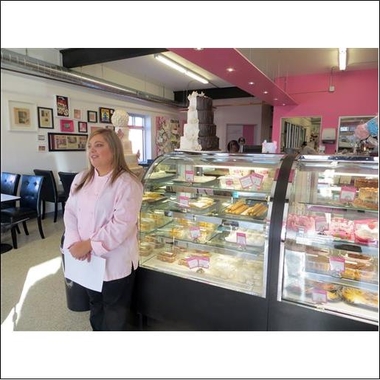Cakes bake tension between gay rights, religious objections

Denver (AP) — A pair of Colorado cases — locally dubbed the "Cake Wars" — have added a new twist to the fight over LGBT discrimination and religious objections playing out across the U.S.
In one dispute, a gay couple who wanted a wedding cake filed a complaint against a baker who turned them away, citing his Christian faith. The other has developed along opposite lines, with a customer requesting a cake with an anti-gay biblical message saying he's been discriminated against by shops that refused him.
Here's a look at where things stand:
___
The wedding cake
Charlie Craig and David Mullins scored a victory in December 2013 in their complaint against Jack Phillips, owner of suburban Denver's Masterpiece Cakeshop. Ruling in their favor, an administrative law judge wrote that "it may seem reasonable that a private business should be able to refuse service to anyone it chooses," but that wouldn't "take into account the cost to society and the hurt caused to persons who are denied service simply because of who they are." Phillips faces fines, and the case is pending in state appeals court.
___
The religious objection cake
Bill Jack went to three bakeries last summer asking for cakes shaped like the Bible with anti-gay religious messages, including "homosexuality is a detestable sin." He was refused and says the shops — Azucar Bakery, Le Bakery Sensual and Gateaux — discriminated against him because he's Christian.
State investigators, however, said he wasn't denied because of his faith, but because the Denver businesses considered his messages as hateful and offensive. Jack's discrimination complaint was denied last month by Colorado's Civil Rights Division, but he plans to appeal.
___
The reactions
Jack released a statement saying the reaction highlights unequal treatment. "It is offensive that the state of Colorado prosecuted Jack Phillips of Masterpiece Cakeshop for bringing his Christian faith to bear in his decision not to bake a wedding cake for a gay couple, yet business owners who decide to refuse service to a Christian wanting Bible verses on cakes are exonerated by the state," he said.
A state lawmaker, Republican Rep. Gordon Klingenschmitt, who sponsored a failed religious objections bill, said all of the bakers should be protected by the First Amendment. He said the decision against Jack showed bias. "I'm very disappointed in the hypocrisy that the Colorado government only punishes Christian bakers."
Le Bakery Sensual's lawyer, Jack Robinson, however, said the First Amendment's free speech guarantees protect the bakers from being forced to communicate a message. "Mr. Jack's actions had nothing to do with religion or being Christian, but everything to do with forcing someone else to publish his hateful speech that was intended to discriminate against a protected class of individuals."
The statement referenced Colorado's anti-discrimination law that protects people against bias in employment, housing and public accommodations. Colorado is one of 21 states whose law expressly includes gays and lesbians.
Marjorie Silva, the owner of Azucar Bakery, welcomed the decision in her favor. "I'm excited and happy that we were not just morally right, but legally right."
___
Elsewhere
Before Indiana legislators passed a religious objections law, triggering a national uproar that spilled into several other state Capitols, a growing rift had been apparent between gay rights advocates and religious groups. Cases similar to Colorado's Cake Wars have popped up across the nation.
A florist in Washington state faces a lawsuit after refusing to provide services for a gay wedding in 2013. Barronelle Stutzman is fighting the case. She's been fined $1,000, but a crowdfunding campaign has netted more than $85,000. Her supporters have compared her benefit page to an Indiana pizza shop that raised more than $800,000 after closing when a co-owner expressed support for the state's religious objections law, which has since been revised to address concerns that it would allow discrimination against gays and lesbians.
The New Mexico Supreme Court two years ago ruled against a photographer who wouldn't take pictures of a gay couple's 2006 commitment ceremony, saying the state's discrimination law was violated.
And in Oregon, two bakers face fines after an administrative law judge ruled they discriminated against a gay couple in 2013 by refusing to bake them a wedding cake.
By Ivan Moreno, Associated Press. Copyright 2015 The Associated Press. All rights reserved. This material may not be published, broadcast, rewritten or redistributed.
The Gayly – April 8, 2015 @ 8:45am.





